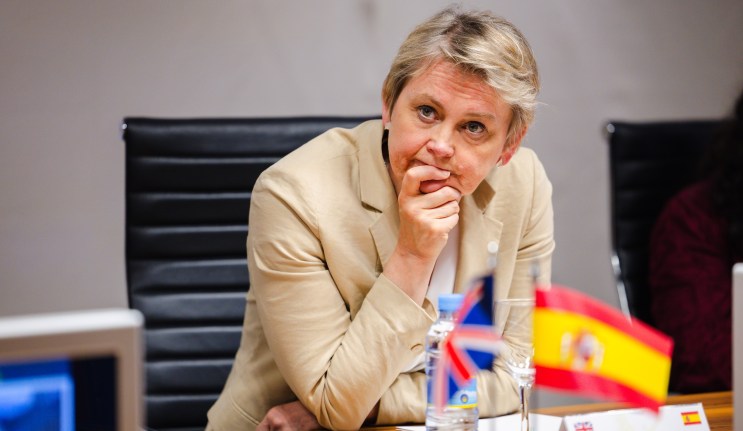Johnson might still be a lucky general. Just as the economic impact of Brexit has, so far, been lost amid the pandemic, so factors beyond the prime minister’s control could yet mean that the union survives his term in office intact
To this end, last month, Conservative culture secretary Oliver Dowden announced that all government buildings would be required to fly the union flag every day as a “proud reminder of our history and the ties that bind us.” (Somewhat tellingly the mandate does not cover Northern Ireland.)
The red, white and blue won’t just fly on official buildings. The recent Dunlop Review – a report, written by the Tory Lord James Dunlop, looking at strategies for “strengthening” the Union – recommended “better branding” for Scottish infrastructure projects financed by the British Treasury. Dunlop also proposed that the prime minister establish a new cabinet position for intergovernmental and constitutional affairs.
Even Covid has had the flag treatment. In November, it was reported that a newly-formed “Union Unit” in Downing Street had asked to get vials of the Oxford AstraZeneca Covid vaccine labelled with the union flag. The idea apparently had “strong backing” from health secretary Matt Hancock.
The Union Unit is symptomatic of the British government’s tin-eared approach to the UK’s decidedly shonky constitutional settlement. Rather than engage with the factors that has led to a sustained lead for Scottish independence in opinion polling – and seen support for Irish unity increase – senior government ministers seem to believe that ‘the Celtic fringe’ can be placated with gimcrack, gimmicks and a handful of sweeties.
Since becoming prime minister less than two years ago, Johnson has launched four separate initiatives aimed at staving off the threat of Scottish nationalism. The Cabinet Office has promised to open a “second flagship HQ” in Glasgow. As many as 500 jobs could be moved north of the border. The secretary of state, Michael Gove, says he will work part-time in the dear green place – although few expect the ever-ambitious Gove to still be in post by then.
Saving the union by decentralisation seems to be the order of the day. Last year, Westminster opened a new £100 million hub in Cardiff. But how likely is this to succeed?
Advertising helps fund Big Issue’s mission to end poverty
Some of Gove’s own staff seem sceptical: in February, former Vote Leave strategist Oliver Lewis quit as head of the Union Unit after less than a fortnight. Lewis – who goes by the nickname ‘Sonic’ because of some apparent likeness to the computer game character that I struggle to see – had reportedly been briefing against his boss, Michael Gove.
Johnson loves to say he will do anything he can to “save the union” but his rhetoric is never backed up by action. The Northern Ireland protocol – the controversial sea border that ostensibly triggered loyalist anger – is a direct product of the prime minister’s hardline Brexit strategy.
The prime minister was warned repeatedly that leaving the single market and customs union would destabilise Northern Ireland, but he ploughed on regardless. When faced with the choice between appeasing English Tory voters and undermining the union, he always chooses the former.
Johnson, however, might still be a lucky general. Just as the economic impact of Brexit has, so far, been lost amid the pandemic, so factors beyond the prime minister’s control could yet mean that the union survives his term in office intact.
The Scottish National Party, fourteen years in power in Edinburgh, is on course for a fourth successive victory but whether Nicola Sturgeon wins an outright majority could depend on her mentor turned tormentor, Alex Salmond. The former SNP leader has said that his new Alba Party will deliver a ‘super majority’ for independence but it could end up weakening the nationalist cause: Johnson is likely to adduce the absence of an overwhelming majority in Scotland for independence to refuse another referendum.
Advertising helps fund Big Issue’s mission to end poverty
On the other side of the political aisle, George Galloway has reinvented himself as an uber-unionist. Galloway – who, like Salmond, has presented on Russian state media – once campaigned as the defender of Scottish Catholics of Irish descent. Now his so-called ‘Alliance for Unity’ proposes partitioning Scotland in the event of a vote for independence.
In some respects, Galloway and Salmond are cut from the same cloth. Both play into the growing culture war divide. Both, too, can be seen as what the Italian Marxist philosopher Antonio Gramsci called “morbid symptoms” that emerge as an old world dies but before a new one is born.
The United Kingdom – a product of the old world of empire and colonialism – could yet limp on for years. There is no solid majority for Scottish independence, much less a supermajority. Irish reunification will be a long, difficult process, if it happens at all. In response, unionism will likely become more bullish, less open to the kind of federal compromises needed to “save the union”. This zombie union might outlast a few more inhabitants of Buckingham Palace.










